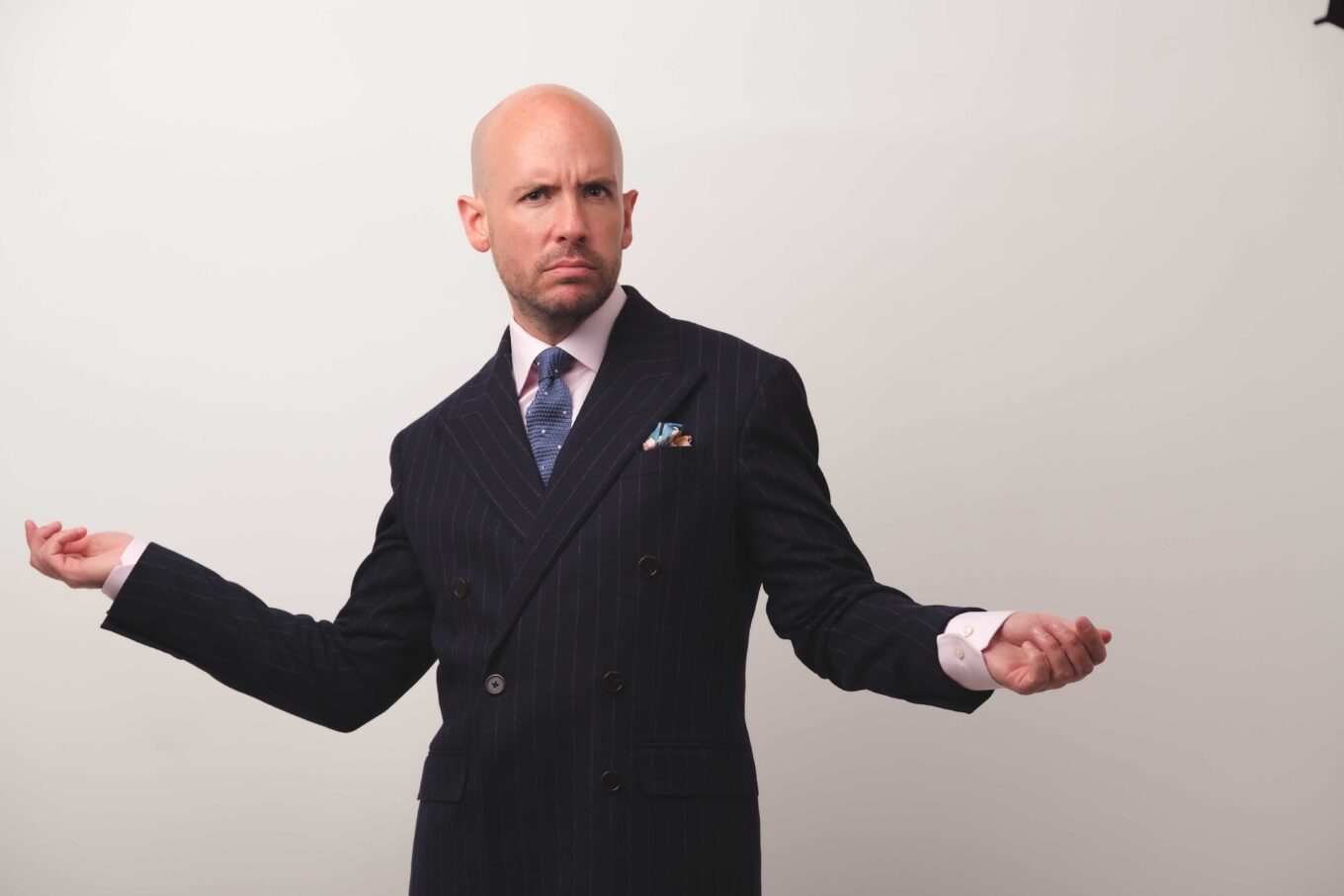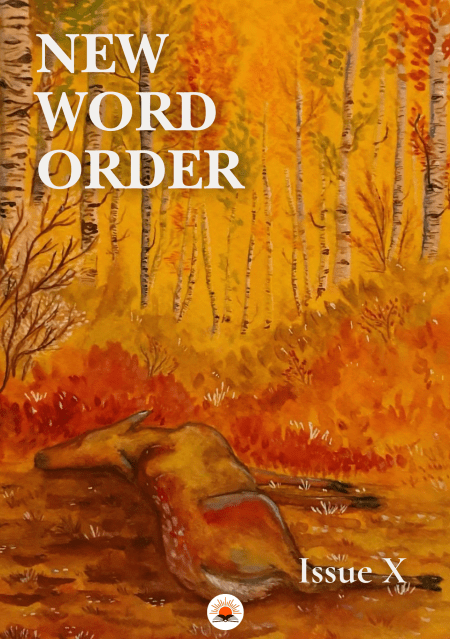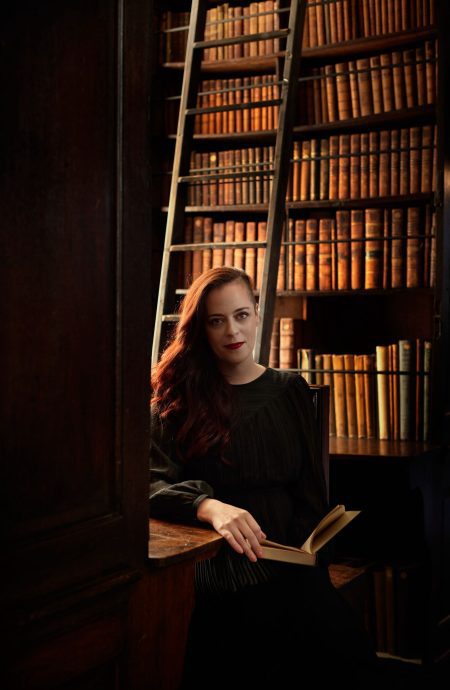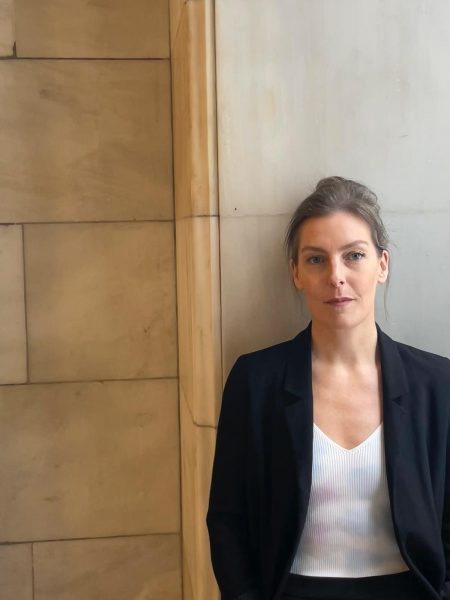Shamelessly Queer: Comedian and No Shame Author Tom Allen Talks Bromley, Berlin, and Latest Book.
Surviving the ‘90s and why coming out isn’t just like flipping a switch
For Bromley-born comedian Tom Allen, the fantasy world inside his head was always much more appealing place than the suburban “middle place” where he grew up. While Cool Brittania ruled the airwaves, Tom spent much of the mid-90s buried in his diaries and the celluloid dreamscape of Fred Astaire movies and Mary Poppins. This love of theatricality is perhaps what led to his somewhat audacious taste in clothing as a child.
A memorable anecdote in Tom’s new memoir, No Shame, sees him dress in Victorian clothing to draw attention away from the fact he was gay. It was not a particularly effective ploy, as Tom remembers today, but a necessary exercise in panache.
“I think there was something about the mid-90s… it wasn’t a flamboyant time. It was quite angsty. All the music seemed to be about, Oh life’s hard, everything’s so intense. So the reason why I talk about that era and that place, is because I think it was when people wanted to blend in, to not stick out. It wasn’t a time when people were engaged in the idea of being an individual or expressing yourself, particularly.”
“I try to epitomise the idea of being from suburbia,” he asserts, “a sort of middle place which at times struggles with its identity; caught between the excitement of the city and the quietness of the countryside.”
Today, Tom Allen is a stand-up comedian and television host well-established in both hemispheres, having graced screens in the UK and Australia for several years while performing live gigs all over the world. Known for his swift, erratic style of stand-up, Tom is a masterclass in camp whose rhetorical trademarks include sudden escalations in volume and amusingly macho impersonations of his heterosexual tormenters.
Tom is also regarded as one of the best-dressed men on television. Matched only by fellow titan of UK comedy Jimmy Carr, who both share a penchant for flash three-piece suits, his love of high-end menswear is actually the evolution of an adolescent coping mechanism.
“As a teenager, I always wanted to wear formal clothing — not as a way of being out there, but it was my way of rebelling. My way of being a rebel, being different.”
These reflections form the body of Tom’s memoir, written in the spring of last year as the UK plunged into its first, seemingly interminable lockdown. Yet it was surely time well spent, as it allowed him to properly evaluate how far he had come — not only in his career, but in owning his own queer identity.
“I always kept a diary as a teenager, as I wanted to have my own little world, my own corner of space away from the questioning and the explaining. Where I could just be. So the stories always existed and I wanted to share them and I wanted to, again, explain myself to the wider world.”
Moving out of childhood in a working-class, conventional area of southeast London, Tom’s process of self-actualisation was one marred by constantly needing to explain himself and his sexuality.
His intention for No Shame is that this personal journey can be one from which readers derive some form of validation or closure.
“I wanted to write about my experience as an outsider — and as a queer person, actually — and how it led me to becoming a stand-up comedian. I spent so much time explaining myself, which I think is what you do a lot if you’re an outsider. But it can’t always be tied up in a bow, so I wanted to write about my own experiences and of creating a fantasy world I could live in that was far away from the meanness of the world.”
The book was an exercise in reflection driven by the desire to be as honest as he could, with a title underlining his attitude toward his own queerness: No Shame. Yet that journey has been a long and convoluted one. Attending school during the era of Section 28, a notorious piece of British legislature that forbade teachers from promoting homosexuality as an acceptable way of life, Tom was part of a generation of young queer people forced into closets.
Where the only representation of gay people on television at the time were those dying of AIDS or simply being attacked for their otherness, “It was really difficult,” Tom remembers, “the idea of being gay. There were no positive statements being made at all — it was very, very frightening. And very upsetting.”
But while he appreciates the greater visibility of queer people today — both in media and day-to-day life — he also believes most aspects of the LGBTQ+ community are still regarded as oddities. Referring to the headlines generated after German actor Jannik Schümann came out via Instagram, he finds the bemusement surrounding queerness to be very frustrating.
“People are saying, I’m just trying to live my life, I don’t want to make a big deal out of it. I happen to be in a relationship or I happen to be in love with this person, why do I have to explain myself? I mean, I just am! Maybe I’ll dress up as a duck tomorrow, too, but today I’m doing this — and really it’s got nothing to do with you.’
Speaking a few months after the book’s original release — on the same day America swears in its newest president, incidentally — Tom feels content with how far he has come.
It has been almost been sixteen years to the day since he first became a stand-up, and to have that experience now culminate in a book is something very dear to his heart. Writing this book has been a deeply cathartic process for him, often forgetting that it would ever be read by anybody at all.
Unlike the dynamic rhythm of live comedy, which relies principally on the set up of a punchline, writing No Shame provided an extended plain of thinking space. Looking at the book now, and the highly positive reception it has gauged from readers — as shown in his social media stories — he says, “It’s been really, really wonderful. I guess I’ve done what I set out to do, which was to offer some comfort to those who felt like an outsider… I hope that I’ve been able to stand with those people and go, It’s okay, we all go through these things and these moments. I hope this offers some guidance or some strength to you.”
Looking back over Tom’s career, one finds some rather odd credits. Chief among which is his role in bizarre 2005 comedy Colour Me Kubrick, in which Tom is first billed on the film’s IMDb page — ahead of John Malkovich, even, whose name is at the top of the poster.
The film follows the misadventures of a man who impersonates reclusive director Stanley Kubrick, despite looking nothing like him, and is “basically a terrible person,” as Tom says, “because he was taking advantage of people. But it’s an interesting story and I had one scene in that; I was very proud of that.”
A highlight of that job was his audition alongside the great American thespian Malkovich. “It was quite overwhelming but he was a very nice man; it was a lovely experience to meet him.”
Another curious checkpoint in Tom’s career is a 2014 gig at the underground club Bar 1820 in Berlin. Having done a few gigs in Germany throughout his career, it is interesting to see on the poster for this event a quote from Attitude magazine hailing him as “a gay role model.” Even before he became a fixture of television screens and stages across the world, Tom’s uniquely flamboyant style of performance had already attracted positive attention by the early 2010s.
Of course, his exuberant performance style helped overcome the cultural barriers of his foreign setting.
Having also performed in Munich a few years before that Berlin gig, he found his audiences were often international and very welcoming. “They were very open,” he remembers of that Munich event, which he upholds as a personal favourite.
“They were so up for it, they laughed the whole time. They spoke impeccable English… I can’t remember how they found me, to be honest. Someone would email and I’d just go, Okay! And just get on a plane.”
Yet for all his success, accolades, and international recognition, it took him well over a decade to truly master his art. While stand-up remains for him the ideal expressive medium, Tom is willing to admit that it’s only been in the last year that he has really come to know himself. His greatest guiding light has been his belief that there was an end point, that he would eventually establish himself professionally and personally.
Not to mention a healthy dose of trial by fire. “Doing gigs that take me out of my comfort zone, it was actually the best thing to do, and it was so liberating because you can’t be anything but yourself. I just had to be myself, embrace who I was and talk about my experiences — and people like it more! The more vulnerable you make yourself, the more people engage with it.”
It is by virtue of his notable public platform — as an author, a television host, a touring stand-up comedian, and a radio presenter — that Tom Allen is able to fulfil a personal dream: that if just one person could see him speaking about his experiences, then they would feel empowered to do likewise.
“Feeling different did hold me back,” he says of those early days in the brutish, blokey British comedy circuits. “You always had to be strong. I feel that’s why it’s all the more important to stand up for it and be open about being — frankly — a bit strange to some people.”
And there’s no shame in that.
***
Tom Allen can be found on Twitter and Instagram, and his memoir No Shame is available for purchase in print and audio book. The writer wishes to extend his thanks to Tom’s agent Amanda Emery, for her assistance in arranging this interview. Images courtesy of Amada Emery PR.
This interview was conducted by Liam Heitmann-Ryce, 24, an Australian writer and editor currently based in the UK. Specialising in interview features, with particular interests in music and LGBTQ+ culture, more of Liam’s work can be found in his digital Portfolio.



